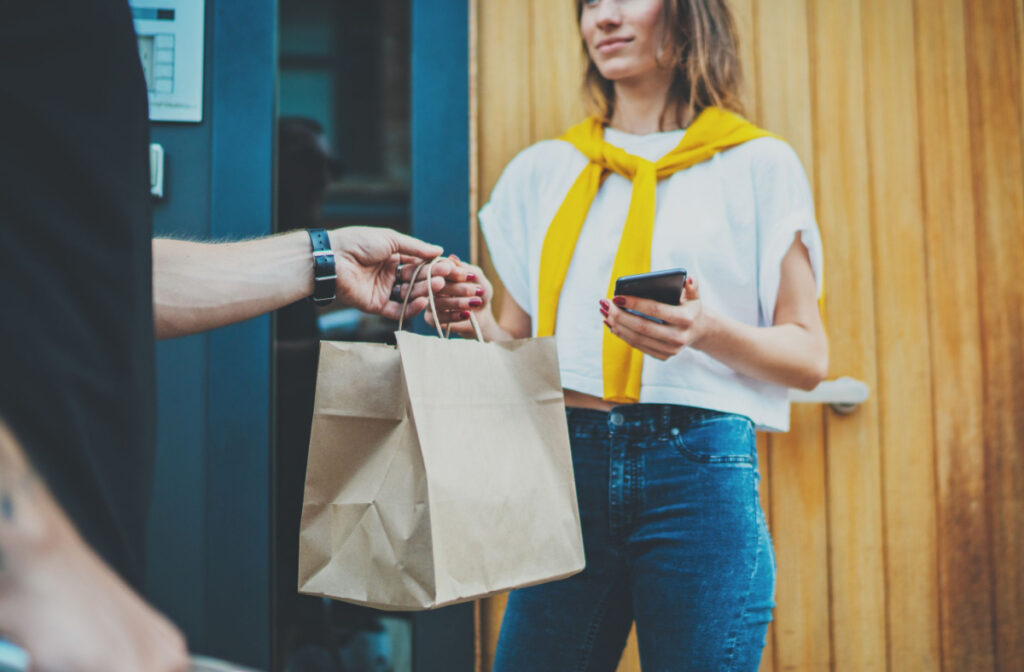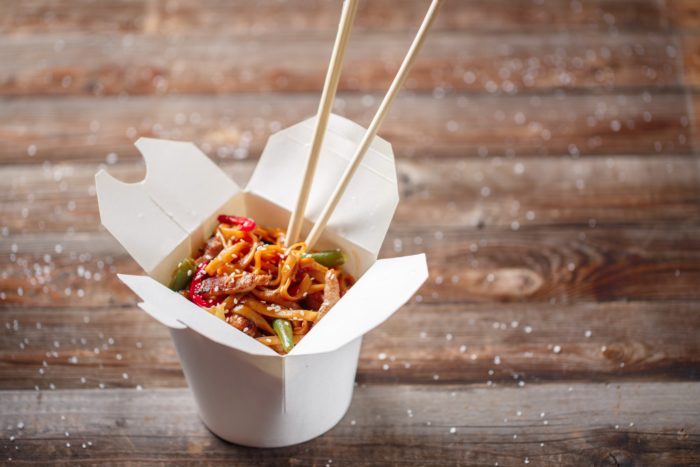Top Class Actions’s website and social media posts use affiliate links. If you make a purchase using such links, we may receive a commission, but it will not result in any additional charges to you. Please review our Affiliate Link Disclosure for more information.

Update:
- Food delivery apps GrubHub, Uber Eats, Postmates and DoorDash appealed a New York federal judge’s ruling that an antitrust class action lawsuit against them not be settled through arbitration.
- On March 16, U.S. District Judge Lewis A. Kaplan ruled the companies did not prove the plaintiffs agreed to arbitrate any claims. The companies filed a notice of appeal of his decision April 7.
- Plaintiffs Mariam Davitashvili, Adam Bensimon and Mia Sapienza say the defendants use their power to impose unlawful price restraints in their merchant contracts, which restricts competition and increases prices for consumers.
- The plaintiffs complain that the defendants entered into “No Price Competition Clauses” with restaurants, which prevents them from charging different prices for meal-delivery customers than they do to dine-in customers for the same menu items.
(April 15, 2020)
Consumers have filed a class action lawsuit against food delivery apps GrubHub, Uber Eats, Postmates and DoorDash, claiming the companies operate an unlawful monopoly.
Plaintiffs Mariam Davitashvili, Adam Bensimon and Mia Sapienza say that the defendants use their power to impose unlawful price restraints in their merchant contracts, which restricts competition and increases prices for consumers.
The plaintiffs complain that the defendants entered into “No Price Competition Clauses” (NPCC) with restaurants, which prevents them from charging different prices for meal-delivery customers than they do to dine-in customers for the same menu items.
The effects of the NPCC is that it acts as an unlawful price restraint which prevents restaurants from gaining market share by charging lower prices to consumers who choose to have their meal delivered or if they dine-in, the plaintiffs allege.
According to the customers, NPPCs harm consumers who purchase meals directly from restaurants in the meal delivery market, as well as those consumers who prefer to dine in the restaurant.
The result of the monopoly forces restaurants to charge competitive prices to customers who do not purchase their meals via delivery apps. This ultimately has the effect of driving those customers to the apps to avoid paying more, the meal delivery class action lawsuit states.
“Unable to offer consumers the increased choice of paying better prices to dine-in, restaurants have seen precious dine-in customers slip away year after year,” the customers maintain.
The GrubHub class action lawsuit allege that meals purchased via the delivery apps are more expensive due to additional fees. The defendants’ NPPCs then make clear that the restaurants must charge dine-in customers the same high fees, the plaintiffs say.
Restaurants have reportedly seen their dine-in market “cannibalized” by the defendants’ delivery apps and they bring this class action for “all Americans who would still enjoy a nice dinner out with their family before Defendants make that impossible.”
The Uber Eats class action lawsuit alleges that restaurants operate in an economic environment where even successful places have slim and diminishing profit margins.
Beginning in the 2000s, Online Meal Ordering Platforms (OMOPs) became popular as the rise of smartphones became the norm, the plaintiffs say.
The meal delivery class action lawsuit also states that, currently, the defendants do not share market power equally in each submarket. Instead, most submarkets are dominated by one or two of the defendants.
“In the case of OMOPs, the more consumers they have, the more restaurants they can lure, thus enabling them to lure more consumers, and so on,” the DoorDash class action lawsuit alleges.
The plaintiffs claim that the restaurants, however, are horizontal competitors with the defendants for food delivery services. Restaurants can offer a nearly identical product as the defendants, with the same functionality, the same ease for users, and the results are the same: delivering a meal to their customers.
In addition, the Postmates class action lawsuit alleges that delivery apps are monopolizing the labor market for delivery people, as they are an essential component of the market for meal deliveries.
They go on to maintain that experienced delivery drivers who know the local streets as well as the apartments could be more efficient than non-experienced delivery workers.
The customers also allege that the defendants do not maintain monopolies because of any special technology or that consumers prefer their products.

GrubHub admitted that consumers are increasingly indifferent to the value that the defendants’ platforms offer, instead choosing the local restaurant they like and utilizing the platform that the restaurant uses, according to the food delivery class action lawsuit.
In addition, the plaintiffs say that the delivery apps are forcing the restaurants to charge higher prices for their meal delivery items because of the defendants’ high fees. Also, independent restaurants have allegedly been hit hard by the defendants’ conduct.
The meal delivery class action lawsuit proposes two classes: 1) “All persons or entities in the United States who, from April 14, 2016 until the anticompetitive effects of Defendants’ unlawful conduct ceases, purchased meals directly from any restaurant that was contemporaneously contracted with the Delivery Apps (the ‘Direct Class’) and 2) All persons or entities in the United States who purchased Dine-In meals from any restaurant that was contracted with the Delivery Apps at any time from April 14, 2016 until the anticompetitive effects of Defendants’ unlawful conduct cease (the ‘Dine-In Class’).
Do you order food delivery service from the defendants? Let us know in the comments section below.
The plaintiffs are represented by Gregory A. Frank, Marvin L. Frank and Asher Hawkins of Frank LLP.
The Food Delivery Monopoly Class Action Lawsuit is Mariam Davitashvili, et al. v. GrubHub Inc., et al., Case No. 1:20-cv-03000, in the U.S. District Court for the Southern District of New York.
Don’t Miss Out!
Check out our list of Class Action Lawsuits and Class Action Settlements you may qualify to join!
Read About More Class Action Lawsuits & Class Action Settlements:
- Judge refuses to certify Chiptole class action over short-changing customers
- Judge gives $7.8M Celsius settlement over false preservative advertising final approval
- Polaner class action over spread false advertising should remain on docket, woman argues
- Poultry companies to pay $35M price-fixing settlement to Washington state















318 thoughts onGrubhub, Postmates, Uber Eats fight for arbitration in price-fixing class action
This seems like a rather silly class action and I will be surprised if it was/is certified by the court. There are many restaurants that have gotten smart and are keeping their locations, yet only doing dine in one or two days a week, if at all, because of the extra staffing and costs required for dine in. They are turning out more meals and making more money than when they were dine in only. And their kitchen staffs are expanding and utilizing flex time, expanding hours etc which leads to even more profitablity and meals turned out.
Also, the majority of states already have laws that stipulate restaurants must charge the same prices for their food items whether it’s dine in, pick up, or delivered by one of the delivery companies. There is plenty of case law already that helps keep prices low for consumers. Often the result of restaurant owners attempting to charge more for delivery customers even though it costs them less to utilize the third party delivery services and not be required to have wait staff on duty full time.
The biggest problem is the fact that consumers/customers try to equate the cost of restaurant made food, groceries, office supplies and/or technology delivery services based on the price of the products when delivery services are an absolute luxury item that is a separate and distinct service offering.
The question for a consumer to ask is, “How much is it worth to me that I, or one of my family members, don’t have to get out in the world, spend the time and money to drive our car to the restaurant to pick up food, deal with traffic, accidents/emergencies, weather etc etc etc, and bring it back home so I (we) can eat my (our) favorite restaurant meal in the peace and solitude of my (our) home, office or jobsite on my (our) own terms?!”
There are huge misunderstandings, in many cases just plain ignorance, about the actual costs for the delivery drivers themselves: FROM the value of the drivers’ time (including wait time at restaurants when orders are not ready at arrival) TO including a small percentage of the expenses for vehicles [insurance; gasoline/EV charging stations; distance to restaurant and delivery addresses; vehicle maintenance (oil/filter changes, tune ups, vacuuming, cleaning, car washes etc); and FROM vehicle depreciation from miles being added etc etc etc TO the cost of purchasing, maintaining and replacing the equipment needed to deliver food safely and professionally (insulated food carriers, coolers/icepacks for beverages, cold desserts/sushi/etc etc etc to the consumers doorstep.
I could go on but hopefully this is enough to educate some people that are intelligent enough to grasp what a luxury having a personal delivery driver actually is. Don’t want to pay a decent fare for the luxury, go get your own food and get over your entitlement complex!
Please add me. I was overcharged.
I ordered and also delivered from 2020. Please add me. Thank you
please dd me
Been driving for Grubhub since 2020, this company takes advantage of the drivers & messes up hours, pickup – drop off times & more, I have documents, screenshots & emails to prove it!!… etc – Add me-
UBER EATS are not transparent with their prices. I went to look at the receipt on the app it say I have to wait 24 hr after my order was put thru. I got an email from Uber Eats they are charging more than it was quoted. This needs to stop.
I have ordered from all of them and still do, they charge way above dine in and have so many more charges on top of that.
A LOT! We’ve probably lost hundreds if not more. Please add me.
Interested in being added as well
Yes how can I get in on this lawsuit because it’s no way they are already charging multiple different fees on top of them charging a higher price on items that are cheaper when purchased in store…
I’ve always questioned how they can change menu’s price that are the same items but if I order from delivery service they charge more than dine in please add me
Ohh yea I have so many unethical things Grubhub, DoorDash and ubereTs have done to me n took my money it sick!! Pls add me
Yess I noticed they was charging more on these third party apps versus in store knowing most ppl only use them because some don’t drive so we can’t get to our favorite restaurants an others can’t get out the house due to some kinda restrictions or mobility.